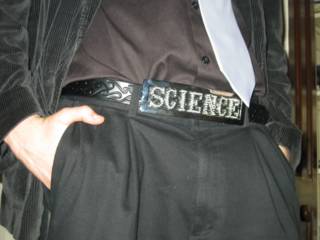
For reasons that will become clear at the end of this post (don't scroll down just yet!), I have decided to answer a question I get asked
all the time: "what's your deal with pirates? Why do you like them so much?"
I've actually taken years to figure out this answer for myself. So let's start at the beginning, with what I believed to be the colossal failure of the staging of my
The American Superhero Applies for a Job. Here I term it a failure because the discussion I was trying to provoke with that piece, one about the incompatibility of the superhero mentality with the modern-day business-driven world, did not once appear in the comments or feedback I received, which overwhelmingly identified the play as "funny," and only just that. In response, I wrote a new play that moved as far away from meaningful subtext as possible - a play about a lonely pirate becoming the new gym teacher for an elementary school. He said he just wanted to be able to be a pirate captain again, even if only of a gym class full of youngsters. In truth, the resulting piece,
The Loneliest Pirate, is the same play as
American Superhero, with all the meaningful subtext replaced with what I believed to be the insane ramblings of a lonely pirate. Whereas
Superhero had eccentric characters with stark truths,
Pirate had cartoonish characters with nonsense to offer. It, too, was received as "funny."
But something happened to me during the staging and performance of that show: Cap'n Scourge, my loneliest pirate, started to make sense. Not a lot, mind you, but enough to leave me wondering about things. This play, too, would be the moment identfied by the Fanciest American as beginning the "resurgence of pirate culture."
I've always liked pirates - who doesn't? - and after a number of pro-pirate events (parties, nights in the dorm, etc.) in the following months, pirates were more of a mainstay among my social millieu. Not much later, I found myself crafting, out of two cheap purchases at Kiwanis, the now-ubiquitous PIRATE sweatshirt. And I found I took great pride in wearing it.
At this point, against thet backdrop of piratey-fun goings-on, an author named David Cordingly makes his appearance in our narrative. His book,
Under the Black Flag, became a favorite read of mine for the simple fact that it was tremendously interesting and had stories about pirates. But, to my fascination, Cordingly revealed a number of critical truths about his subject. Namely, that most of the pirates started out as honest sailors, working back-breaking labor for bad wages, who were forced to deal with inept captains - captains placed in charge by their ship-owner fathers with no experience to earn them their position. Too poor to own their own boats, these sailors toiled on some Fat Cat's boat with no say in their working conditions.
Those sailors made a crucial decision: that rather than continue in the unfair system, they could seize control of the boats, give every man an equal say in the decisions and an equal share of the profits they'd be taking from the Fat Cats. Pirate ships were, as Cordingly points out, some of the first real democracies the world had ever seen. He also notes that a great many sailors on those ships robbed by pirates elected to join their robbers' crew in order to get a more agreeable job.
In effect, the pirates decided they didn't have to take the deal they were being given; they didn't have to play the hand they were dealt.
Example? Cheng I Sao, the cantonese prostitute who decided she'd rather build the largest pirate fleet in history - one which frightened off the British Navy.
These stories told by Cordingly began to remind me of someone else. Namely, the pirate-y-est guy I can think of today, my father. A man whose tremendous artistic talents have (in the years I've been around) been grossly underappreciated and under-utilized by his employers, and has forged his own ways to express his creativity, with breathtaking results. Perhaps his greatest talent is taking garbage - literally, discarded materials - and turning it into beautiful works, not least amongst which are the displays that capture the interest and imagination of adults and children by the hundreds every Halloween. How's that for not just accepting things as they're offered to you?
In my own life, I think this defiant sense of being entitled to self-determination has largely underscored my theatre work. Whether dealing with teens in an area of extreme improverishment, who are told to strive for nothing more than mediocrity, or with adults with mental illness, who are told they are fundamentally flawed and undeserving of fair treatment, I have been proud to carry and spread the conviction that you don't have to take the deal you're given, and just because you were dealt a bad hand doesn't mean you have to follow the rules. And I have been very proud of what has come from that belief.
And from my father leading a hacksaw raid on an old stat camera being thrown out and making off with several hundred dollars worth of lenses, back to my rum-running relatives during prohibition, to my ancestors whose clan was synonymous with doing things in their own way, the pirates (albeit in an editorialized fashion) stand as colorful and tremendously fun exemplars of the aforementioned beliefs.
So now I'm proud to carry these beliefs in a new way, as I have with other fundamental tenets of my life:

I guess Cap'n Scourge needn't feel so lonely, after all.




